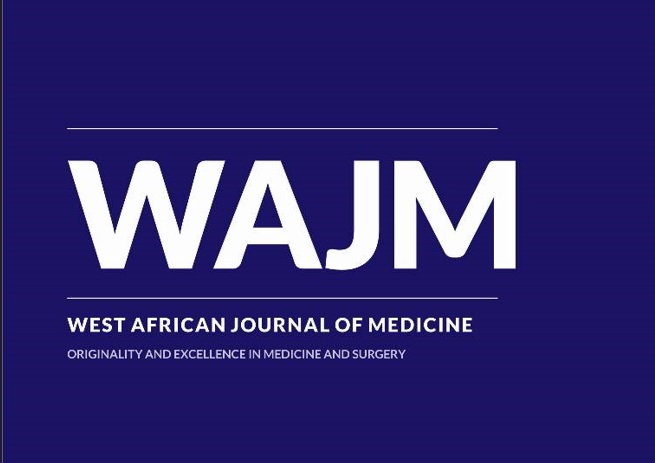EDITORIAL: COVID-19 AND TUBERCULOSIS ARE STILL WITH US
West Afr J Med. 2021 Jan; 38(1): 1-2. PMID: 33463698
Abstract
WELCOME TO 2021:
COVID-19 AND TUBERCULOSIS ARE STILL WITH US
It is with great delight that I present the first edition of the West African Journal of Medicine for the year 2021. As usual it contains articles from researchers from both the West African College of Physicians and West African College of Surgeons and spans the fields of medicine, and medical subspecialties, surgery and surgical subspecialties, obstetrics and gynaecology, paediatrics, and histopathology, amongst others. This edition brought news from the Colleges. New officers have resumed to man the various faculties both in surgery and medicine. We believe that they will come up with creative ideas and positive outlook to change the dynamics of both colleges. We count on their support of the West African Journal of Medicine which serves as our window to the world. It is also of importance to know that the West African College of Physicians have started plans to use the CBT as a means of assessing the candidates. This will make the exams more efficient as has been tested in sister colleges.
As I write this editorial, the world is still grappling with impact of COVID-19 infection. The challenges of COVID-19 remain as the world faces a new resurgence. In the last three months, new cases have been steadily increasing globally, rising from about 300,000 daily-cases in early October 2020 to over 600,000 daily-cases in December, 2020.1 This has been attributed to newer strains of the virus, relaxation of public health and social measures and laxity in infection prevention and control measures. Of utmost importance is the new variant of coronavirus that has been found in United Kingdom and there is fear of its spread round the world.
For us in Africa, the impact of COVID-19 can be quite enormous. We have a very fragile economy and a very fragile health system. The emphasis on COVID-19 has resulted in less focus on other communicable and non-communicable diseases. Many people are dying from non-COVID related diseases. The challenge of getting vaccines for developing countries is huge. Hopefully, the world will come to a consensus and will be able to help in this quest.
Despite the ravaging nature of COVID-19, the impact of other endemic diseases such as tuberculosis continues unabated in Africa. Tuberculosis has been known since antiquity but the disease is still with us. The impact of the disease goes beyond the physical effect; it also has a debilitating effect on the psychological, social, emotional and economic well-being of the patient. Of immense effect on the patient is the self-perceived and public stigmatization, and the diminished capacity to work and generate viable income, thus engendering financial hardships and low socioeconomic status.2,3 Though studies have found that the quality of life generally improves following standard anti-tuberculous therapy, many patients continue to demonstrate residual impairment.2
Impairment in quality of life and subsequent recovery of full functioning have also been found to differ based on the stage and severity of the disease. Due to the extensive and prolonged disease in patients with Multi-drug resistant (MDR-TB) and extensively – resistant tuberculosis (XDR-TB), affected patients are subjected to longer duration of treatment, use of injectables, which is often unpalatable; frequent adverse effects, intense social stigmatization, psychological trauma and suboptimal outcomes. Hence, quality of life has been found to be much more impaired in this category of patients compared to patients who were cured and recover fully after six months of therapy.2,4,5 In this edition, Ojuawo et al assessed post-treatment health-related quality of life among patients with pulmonary tuberculosis. Their findings showed significant impact of PTB on the individual’s quality of life, despite microbiological cure.
Health-related quality of life is of utmost importance in the management of patients during and post-TB management. Assessment should not just focus on the hard tools but also on the soft tools that assess impairment in quality of life. Patient management should not just be focused on drug management alone but the approach must be wholistic, putting emphasis on the soft skills of medicine such as empathy and offering psychotherapy alongside DOTS therapy. We must see our patients in their totality and seek to integrate them successfully back into the society post-treatment. Most of the studies done in Africa have used foreign quality of life tools in assessing HRQoL among Africans. However, efforts must be put in place to design quality of life tools in sync with local challenges, which can be adaptable to Africans. Quality of life assessments should also be extended to other chronic diseases encountered in our practice. This will further strengthen care for our patients.
As we begin this year, we promise to continue prompt review and publication of your articles. We look forward to more participation from authors and researchers to make this journal effective.
Wishing you a prosperous New Year.
REFERENCES
- COVID-19 Map - Johns Hopkins Coronavirus Resource Center [Internet]. [cited 2020 Dec 22].
- Aggarwal AN. Quality of life with tuberculosis [Internet]. Vol. 17, Journal of Clinical Tuberculosis and Other Mycobacterial Diseases. Elsevier Ltd; 2019 [cited 2020 Dec 22].
- Salehitali S, Noorian K, Hafizi M, Dehkordi AH. Quality of life and its effective factors in tuberculosis patients receiving directly observed treatment short-course (DOTS). J Clin Tuberc Other Mycobact Dis. 2019 May 1;15:100093.
- Alene KA, Clements ACA, McBryde ES, Jaramillo E, Lönnroth K, Shaweno D, et al. Mental health disorders, social stressors, and health-related quality of life in patients with multidrug-resistant tuberculosis: A systematic review and meta-analysis [Internet]. Vol. 77, Journal of Infection. W.B. Saunders Ltd; 2018 [cited 2020 Dec 22]. p. 357–67.
- Jaber AAS, Ibrahim B. Health-related quality of life of patients with multidrug-resistant tuberculosis in Yemen: Prospective study. Health Qual Life Outcomes. 2019 Aug 16 [cited 2020 Dec 22];17(1).


